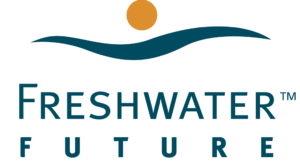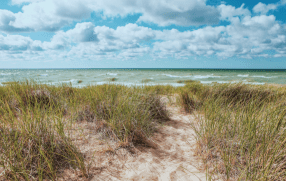“State of Water” Podcast Features A Conversation with Freshwater Future’s Executive Director
The popular podcast “State of Water” with Seth Bernard launched a new wave of episodes this week including one featuring Jill Ryan, powerhouse Executive Director of Freshwater Future. “State of Water” (part of Title Track’s Clean Water Campaign) highlights inspiring stories and insights from compelling activists and leaders. Find it wherever podcasts are streaming. Click here to learn more: https://www.facebook.com/MIcleanH2O/videos/1194701804448483

Touring One of the Most Polluted Areas in Michigan
Freshwater Future staff member Anna Bunting embarked on a “toxic tour” of one of the most polluted areas in Michigan, the 48217 area in Southwest Detroit. From a polluted construction site to a teach-in on PFAS, you can read all about this immersive community experience that highlights how residents are working to take actions to reduce the impacts of industrial pollution and forever chemicals.
Benton Harbor Water System Alternatives Analysis Finds Retaining Ownership the Best Option
Due to the lead in Benton Harbor’s water system, the City of Benton Harbor contracted a water engineer to assess the different options that the city can take to provide water to residents. On December 19th, the city commission will vote on which path Benton Harbor’s water system will take. After reviewing this document, Freshwater Future believes there is only one option that makes sense for protecting the water and people in Benton Harbor: the city retains ownership and operation of the water system (Alternative 1). Retaining ownership will provide the lowest estimated annual rate increase, and it ensures the community’s right to self-governance over the water system.
Ontario’s proposed More Homes Built Faster Bill Significantly Impacts Environmental Policy and Regulation
You can help, ask Premier Trudeau to speak out and step up to protect the Great Lakes that fall under his authority. Last week we shared that the Ontario Legislature recently introduced the More Homes Built Faster Act, 2022 with the goal of building 1.5 million homes in the next decade. If passed as proposed, Bill 23 will cause long-term environmental harm, fundamentally changing how environmental planning is done in Ontario, and rolling back 70 years of successful science-based watershed protection by Ontario’s Conservation Authorities. All communities that depend on the Great Lakes should be concerned about this Bill – the Great Lakes are a shared resource between Canada, the US and over 200 First Nations and Tribal communities – we should all have a say in their protection.








